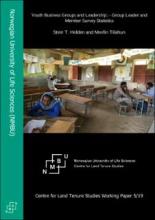Land Library
Welcome to the Land Portal Library. Explore our vast collection of open-access resources (over 74,000) including reports, journal articles, research papers, peer-reviewed publications, legal documents, videos and much more.
/ library resources
Showing items 1 through 9 of 15.Women and youths encounter problems with access to land, as well as securing tenure in land resources [...]
Forests managed by Indigenous and other local communities generate important benefits for livelihood, and contribute to regional and global biodiversity and carbon sequestration goals. Yet, challenges to community forestry remain.
This article summarizes the evidence on youth land rights in Liberia from a literature review combined with primary research from two separate studies: (1) A qualitative assessment conducted as formative research to inform the design of the Land Rights and Sustainable Development (LRSD) project f
An increasing number of African States are recognizing customary land tenure. Yet, there is a lack of research on how community rights are recognized in legal and policy frameworks, how they are implemented in practice, and how to include marginalized groups.
Continued strong population growth in already densely populated rural areas in parts of Sub-Saharan Africa makes it harder for youth to choose agriculture as their main source of income. We investigate whether near landless youth still can access rented land as a complementary source of income.
We study how social preferences and norms of reciprocity are related to generalized and particularized trust among members of youth business groups in northern Ethiopia. Members of these groups are recruited among land-poor rural youth.
This working paper is an output from the research project “Youth Business Groups for Sustainable Development: Lessons from the Ethiopian Model” that is funded by Research Council of Norway under the NORGLOBAL2 research program for the period 2019-2022.
This working paper is an output from the research project “Youth Business Groups for Sustainable Development: Lessons from the Ethiopian Model” that is funded by Research Council of Norway under the NORGLOBAL2 research program for the period 2019-2022.
Building inclusive societies that reflect the needs of all categories of people within the social spectrum is critical to achieving sustainable development.








